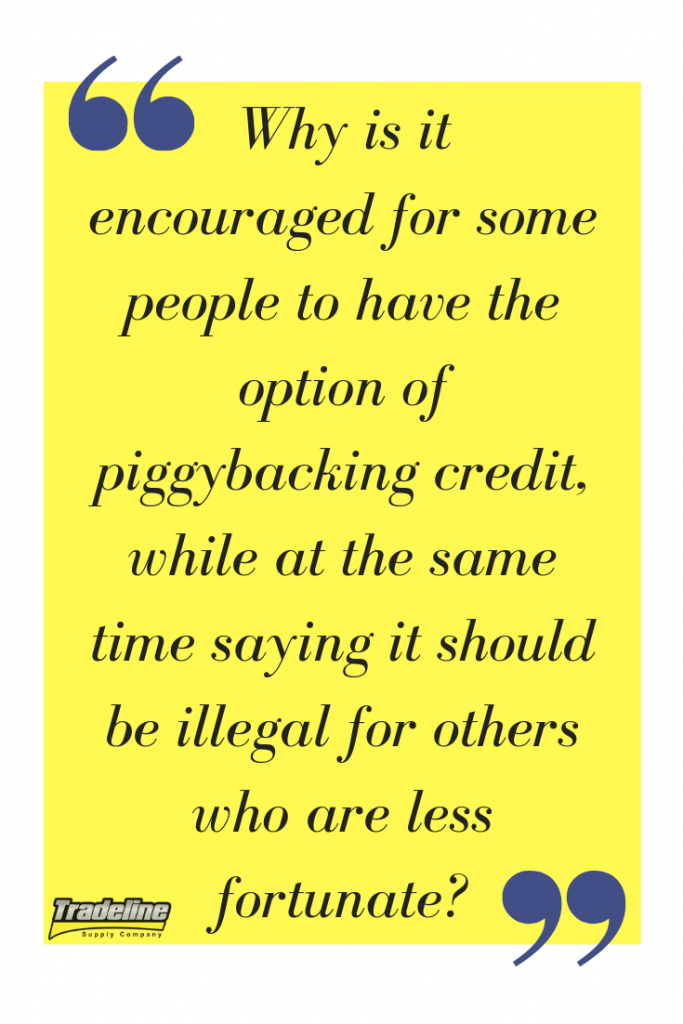Are Tradelines Legal?

How to Protect Your Finances and Credit During the Pandemic
07/31/2020
Credit Expert: Can Authorized User Tradelines Build Credit?
09/13/2020Often, when people first hear about the tradeline business, one of their first questions is “Are tradelines legal?” We are not surprised when this question is asked for a couple of reasons.
One, most people believe when something sounds too good to be true then there has to be a catch. In the case of tradelines, people instinctively question its legality.
Another reason this question makes sense is that there is an inherent ethical concern of “is this gaming the system?” The question of ethics is a separate matter, but it does make sense to ask if buying tradelines is legal.

After a congressional hearing, FICO decided to keep authorized user tradeline benefits in their credit scoring model. Photo by Jomar on Unsplash.
When it comes to the question of whether tradelines are legal, first, Tradeline Supply Company, LLC does not give legal advice and is not an authority on being able to definitively say what is legal and what is not. However—to help better frame tradeline legality common understandings—we share references below to what some government authorities have said about tradeline legality.
Some History About Tradelines
In 2008, the Fair Isaac Corporation (the creators of the FICO score) took this issue of authorized user (AU) tradelines all the way up to Congress and (unsuccessfully) tried to eliminate the ability for AU tradelines to be factored into FICO scores.
As a result of this congressional hearing, the Fair Isaac Corporation reversed their stance, saying “After consulting with the Federal Reserve Board and the Federal Trade Commission earlier this year, Fair Isaac has decided to include consideration of authorized user trade lines present on the credit report…”
The main factor that led to the Fair Isaac Corporation changing their position is the Equal Credit Opportunity Act of 1974 (ECOA) and specifically Regulation B of that statute. ECOA prohibits FICO from discriminating based on marital status, and since most financial institutions do not distinguish whether an authorized user is a spouse or not, often, all authorized user accounts are considered.
Therefore, as this illustrates, there are federal statutes that complicate the legal opposition against tradelines.
Two years later, in 2010, the Federal Reserve Board (FRB) conducted a large-scale study on the impacts of “piggybacking credit.” They concluded that although consumers with thin or short credit files may potentially benefit from piggybacking, overall, piggybacking does not have a large effect on credit scores. Essentially, they found that piggybacking does not significantly affect the credit industry.
You can read more about the studies and regulations regarding tradelines in our article, “Do Tradelines Still Work in 2019?”
The Common Practice of Piggybacking Credit
Piggybacking credit is a practice that banks promote to help loved ones get a head start on building good credit.
Aside from what has taken place at congressional hearings and conclusions from the FRB, piggybacking credit, in general, is actually a common and accepted practice and even promoted by banks themselves.
To see for yourself, go to any major bank’s website and type in “authorized user” into their search bar. Countless articles will come up that describe how you can add other people to your credit cards as authorized users for the express intention of boosting their credit scores.
Using this method to help young adults, friends, and family get a head start in credit has been promoted for years and is common knowledge for many consumers.
In a study by the Consumer Financial Protection Bureau (CFPB), they concluded that nearly 25% of all consumers with credit files initially established their credit through some form of piggybacking.
Additionally, in the FRB study, they found that over one-third of the credit files that could be scored had at least one authorized user account in their credit profile.
The conclusion here is that piggybacking credit is an extremely common practice. This is not isolated just to the small industry of companies who help people sell and buy tradelines.
The large-scale studies mentioned above were designed to be representative of the entire American population. Many interesting points were brought to light from these studies, but none were more obvious than the fact that piggybacking credit is a significant part of our credit system.
The FRB study even showed that credit scoring models that include authorized user data were more accurate in their predictions than models that did not include AU data.

Equal Credit Opportunity
From an ethical standpoint, even those who are against the tradeline industry usually still believe it is advisable for them to add their children or loved ones to their credit cards as authorized users.
Therefore, there appears to be a double standard about who exactly has the right to receive that benefit.
Should friends and family of those with good credit be the only ones who legally have access to that option? Why is it encouraged for some people to have the option of piggybacking credit, while at the same time saying it should be illegal for others who are less fortunate?
It seems that the only fair solution is either everyone has access to that option or no one has access to that option. Due to ECOA and Regulation B, the current reality is that some people definitely have access to piggybacking credit, while others do not.
Bad Practices Do Exist Within the Tradeline Industry
While the practice of buying and selling tradelines has not proven to be illegal, we are not claiming that all tradeline companies operate legally or ethically. Unfortunately, we see many illegal and unethical tactics within the tradeline industry that consumers should watch out for.
For example, an increasing number of scammers in the tradeline and credit repair industries are selling people “credit profile numbers” or “credit privacy numbers,” also known as CPNs. These scammers claim that you can buy a CPN and use it instead of your SSN to apply for credit if you have bad credit and need a “clean slate,” but this is a dangerous falsehood.
The use of CPNs involves identity theft and synthetic identity fraud, and misrepresenting your SSN is a federal crime. It is crucial that your tradeline company takes extensive measures to prevent fraud and comply with the law.

Watch out for illegal tactics in the tradeline industry, such as CPNs and address merging. Photo via seniorliving.org.
Another very common but illegal tactic is known as “address merging.” With this method, the tradeline company asks the authorized user to falsely claim that their address is the same as the primary user’s in order to make it more likely that the tradeline will post.
In some cases, this even involves the company pulling the client’s credit report using the fictitious address. If a company can only get tradelines to post by asking their customers to commit address fraud, that is not a good sign.
Final Thoughts
Parents are still going to be able to add their kids to their credit cards to help them get a head start in life, and those who are not fortunate enough to have that family member will still be able to find equal opportunities in the marketplace.
While the tradeline industry is definitely a controversial topic, this points to larger issues in the credit system overall. Some argue that the credit bureaus are outdated or broken systems. It is fair to say that the credit scoring models are less than perfect.
On the other hand, many people seem to forget that the credit bureaus are for-profit corporations that are in business to make money. So before we go too deep into the ethics of tradelines, we should ask who created this system to begin with and who it exists to serve.
Was the system created with equality and fairness in mind? Does the system provide equal credit opportunity for all?



